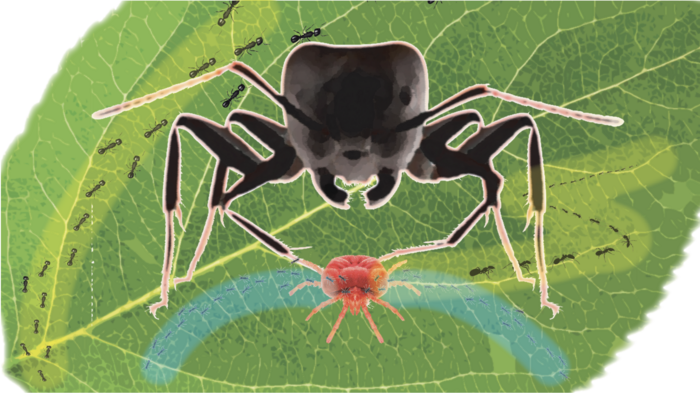Kyoto, Japan — Ants may not urinate to mark their territory as dogs do, but the behavior of spider mites might suggest otherwise. Under significant pressure from ants, mites have to choose between safety and risk: staying out of ant territory to avoid predation or venturing into it to find food.

Credit: KyotoU/Global Comms
Kyoto, Japan — Ants may not urinate to mark their territory as dogs do, but the behavior of spider mites might suggest otherwise. Under significant pressure from ants, mites have to choose between safety and risk: staying out of ant territory to avoid predation or venturing into it to find food.
Now, a team of researchers at Kyoto University have studied two species of spider mites that avoid trace chemicals left by ants within their territories. Tetranychus kanzawai and T urticae both avoid food plant leaves with active traces of two ant species.
“These mites also avoided walking along ant-traveled food plant stems as a way to evade their natural predators,” says lead author Shuichi Yano. Because edible leaves are connected by stems, such a defensive move denies mites access to significant food resources.
The chemicals ants leave are information intended for nestmate and non-nestmate ants, and mites have developed an ability to detect active traces as hints of danger. Other herbivorous insects have also been reported to avoid plants inhabited by ants.
“The effectiveness of such non-consumptive effects of predators on prey are sometimes comparable to that of direct consumption,” notes the author.
The team conducted dual-choice experiments using kidney bean leaves and stems arranged side by side to examine how mites traveled along tainted parts of branches.
“Surprisingly, spider mites avoided traces of both enemy and non-enemy ant species, suggesting that these cognitively limited mites have not developed species-specific avoidance abilities against all predators,” adds Yano.
Ants consume various arthropod species, implying that spider mites may not be the only species of prey that avoid ant trace chemicals.
“Using this knowledge, pesticides that are based on ant trace chemicals could possibly complement if not replace synthetic ones.”
###
The paper “Avoidance of ant chemical traces by spider mites and its interpretation” appeared on 25 October 2022 in Experimental and Applied Acarology, with doi: 10.1007/s10493-022-00752-5
About Kyoto University
Kyoto University is one of Japan and Asia’s premier research institutions, founded in 1897 and responsible for producing numerous Nobel laureates and winners of other prestigious international prizes. A broad curriculum across the arts and sciences at both undergraduate and graduate levels is complemented by numerous research centers, as well as facilities and offices around Japan and the world. For more information, please see: http://www.kyoto-u.ac.jp/en
Journal
Experimental and Applied Acarology
DOI
10.1007/s10493-022-00752-5
Method of Research
Experimental study
Subject of Research
Animals
Article Title
Avoidance of ant chemical traces by spider mites and its interpretation
COI Statement
The authors declare no competing interests.




